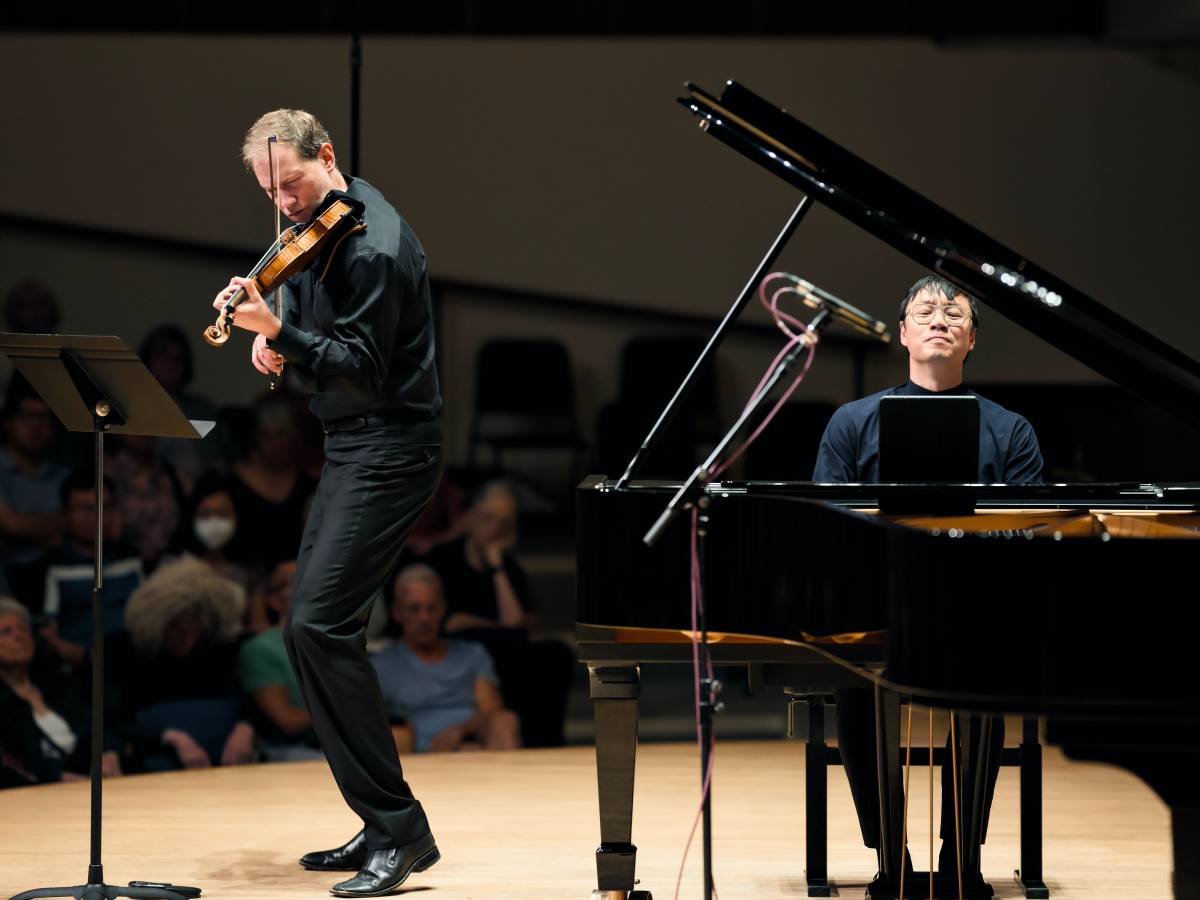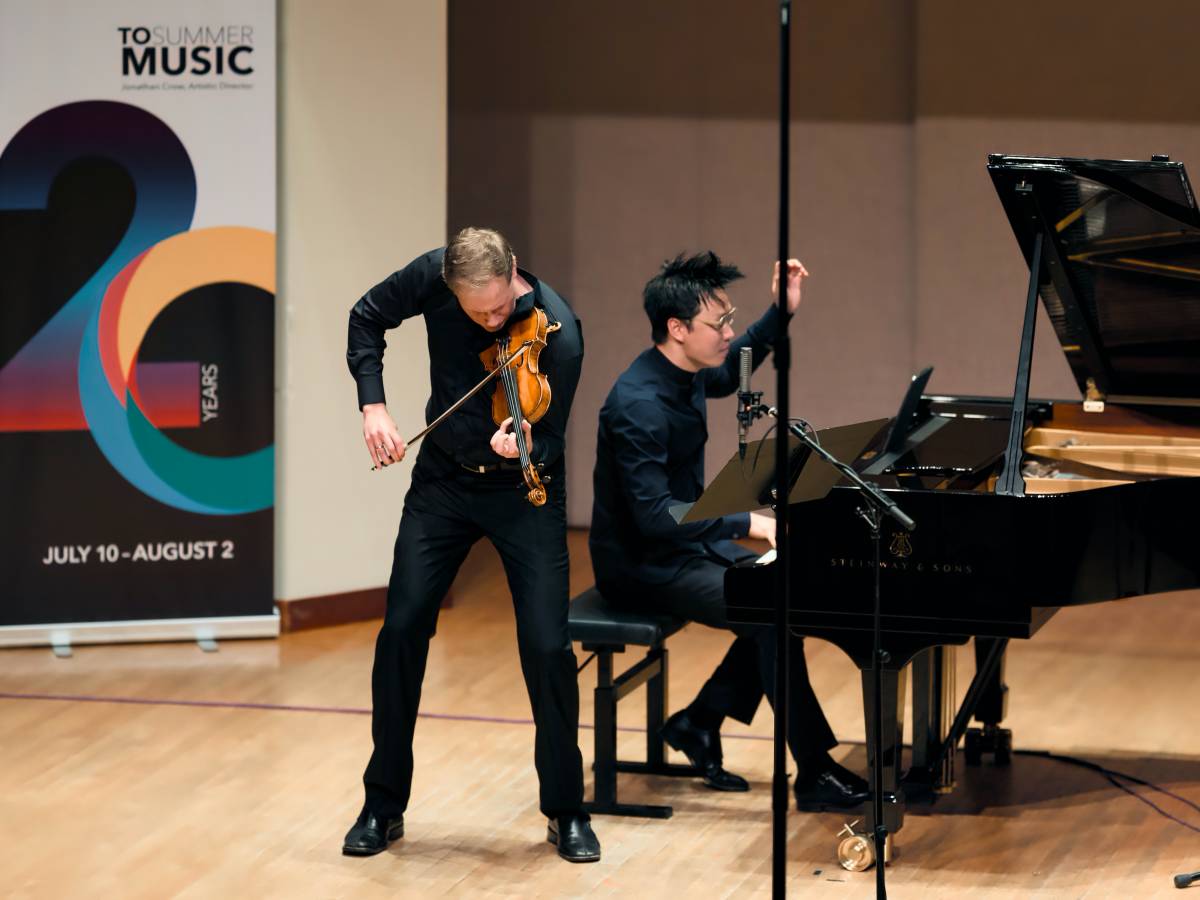Toronto Summer time Music: Crow & Chiu. Bartok: Romanian Folks Dances for Violin and Piano (arr. Székely); Carmen Braden: New Work for Violin and Piano (World Première); Janáček: Sonata for Violin and Piano, JW VII/7; Grieg: Sonata for Violin and Piano No. 3 in C minor, Op. 45; Ravel: Tzigane, M. 76 . Jonathan Crow, violin; Philip Chiu, piano. July 28, 2025, Walter Corridor.
The environment at College of Toronto’s Walter Corridor this July 28 might need been sombre because the capability crowd waited for the ultimate live performance look of Philip Chiu and Jonathan Crow, two gamers who’ve come to exemplify the fellowship and musicianship of Toronto Summer time Music (TSM).
Then, Chiu, the elegant pianist, appeared on stage with a self-effacing patter about his nice enjoyment working with violinist and outgoing TSM director Crow, concluding with a humorous however heartfelt pitch to safe extra donations for a pageant that has come to outline the summer season for a lot of Torontonians.
It perked up the gang and set the stage for a memorable night of music, curated by Crow to discover the affect of folks music on classical compositions, from the Romantics to immediately.

Live performance: First Half
This system began appropriately with Bartok’s Romanian Folks Dances for Violin and Piano, a bit in six actions, which allowed the duo to envelop the viewers in music that ranges from lyrical to introspective whereas giving Chiu and Crow the chance to play with viewers pleasing virtuosity.
Whereas it hardly felt like fiddle music from the hills of Transylvania, the melodies have been transcribed by Bartok within the early days of his profession, when he helped to ascertain the now burgeoning area of ethnomusicology. Crow and Chiu transported the viewers with music that moved from the lilting to mournful to the romantic — all rendered with a rhythmic sensibility that evoked in style dance.
For his or her second piece, the duo moved to the completely modern: the premiere of a piece by Yellowknife composer Carmen Braden.
Entitled Swap and Spurs, the piece, which drew an ovation from the gang, was meant by Braden, who composes successfully within the classical, jazz and pop idioms, to pay homage to Crow’s 9 years on the helm of the TSM.
Braden was known as on the stage earlier than the piece was carried out to introduce the work, and she or he stunned Crow by asking the viewers to sing a stunning two line melodic verse that was its inspiration, “I dream of an Ocean, underneath a Prairie Sky.” Hesitantly, after which singing with gusto, they did as Braden requested — after which Crow and Chiu performed her work, which was complicated however relatable. It clearly had the melody as its inspiration.
Because it occurs, I sat subsequent to Carmen Braden and was capable of ask her concerning the composition. She had not been impressed by a folks tune of the North — the composition is completely her personal. And, the prairie sky within the piece isn’t about her native Yellowknife, however Medication Hat, really a city the place one can see the heavens. As for the tune, Braden is comfortable to say it as folks music, since we’re all “volk,” that means, in German, “the folks” and she or he is one.
I couldn’t assist however level out that she’s extra gifted than most “volk,” to which she smiled and politely shrugged.
Jonathan Crow adopted Braden’s premiere with a beautiful rendering of Janacek’s Sonata for Violin and Piano, one of many composer’s most interesting chamber music items, written in the summertime of 1914, simply earlier than the start of the First World Conflict.
Not solely is Crow a high-quality violinist and pageant coordinator, however he’s additionally a marvellous recounter of historical past. He identified that Janacek was a nationalist Czech, who hoped {that a} conflict would deliver a Russian invasion that might free his nation from Austrian rule. A part of the music within the sonata exhibits a Russian affect — a tribute by Janacek to his imagined liberators. And, like Bartok and Dvorak, Janacek hung out exploring the people music of his folks and the Central European area, so crammed with customs and traditions and mythology. So, the music of the Czechs seems within the Sonata.
As if that wasn’t sufficient historical past for many audiences, Crow went on to speak a few movie that’s iconic in Czech historical past. The Insufferable Lightness of Being, based mostly on Milan Kundera’s acclaimed novel, was an enormous crucial and cultural hit starring Daniel Day-Lewis and Juliette Binoche in 1988. It famously used a rating based mostly on Janacek’s chamber and piano music, together with the sonata, two string quartets and the extraordinary piano items, “On an Overgrown Path.”
Crow discovered it ironic that Janacek’s pro-Russian sonata and different items by him have been used to make a globally profitable movie, which criticized Russia (or extra precisely the Soviet Union), a rustic Janacek had embraced throughout his lifetime.
Crow and Chiu’s remaining piece earlier than Intermission was additionally within the folks mode and it, too, has a singular historical past. Ravel’s Tzigane could also be a pastiche of true folks music, however it stays a compelling work. Impressed by two ladies, Ravel’s outdated buddy Helene Jourdan-Morhange and the piece’s dedicatee Jelly d’Aranyi who premiered it on violin with Henri Gil-Marchex on piano, it calls for virtuosity in its taking part in.
When executed proper — because it was by Crow — the violinist attracts the viewers’s consideration by the seemingly ecstatic taking part in of trills, runs and staccato notes. Though Tzigane, which suggests “gypsy” or extra correctly Roma, is impressed by d’Aranyi’s taking part in of Hungarian items to Ravel, it’s not really folks music — only a well-meaning parody by a superb Frenchman of one other tradition and magnificence.

After Intermission
When Crow and Chiu returned after Intermission, they concluded the official program with a terrific rendition of Grieg’s Violin Sonata no. 3.
Whereas Bartok, Janacek and Ravel had a problematic relationship to Romanticism, particularly as their work matured, Grieg’s work embraces the designation. His work is passionately engaged with Norway and its historic roots, which might be heard particularly within the concluding allegro motion of the sonata. As Chiu defined earlier than he and Crow performed the piece, this extraordinary sonata was so technically and melodically superior that it helped to ascertain Grieg on the world stage.
Crow and Chiu’s efficiency of Grieg’s Violin Sonata enraptured the viewers, which led to 2 encores: Gershwin’s “It Ain’t Essentially So” from the arguably folkloric opera Porgy and Bess and a lyrical rendition of Elgar’s sentimental Salut d’Amour.
Whereas the Gershwin match into the night’s exploration of folks music, the Elgar was carried out as a result of it had been performed by the duo at their first live performance at TSM 9 years in the past. As such, it represents a becoming conclusion to the performances of a pair who’ve turn out to be iconic over time.
The names of Jonathan Crow and Philip Chiu will certainly be remembered because the Toronto Summer time Music pageant continues, one hopes, for a few years.
By Marc Glassman for Ludwig-Van.com
Are you trying to promote an occasion? Have a information tip? Have to know the perfect occasions taking place this weekend? Ship us a word.
#LUDWIGVAN
Get the each day arts information straight to your inbox.

